In today’s world, cybersecurity professionals play a crucial role in safeguarding sensitive information and maintaining the integrity of digital systems. As the demand for skilled professionals in cybersecurity grows, obtaining certifications in the field has become an important step for many looking to advance their careers. However, the cost of these certifications can vary greatly depending on several factors. This blog will explore the factors affecting cybersecurity certification costs, the average price for popular certifications, additional expenses, financial assistance options, employer sponsorships, and the return on investment (ROI) for these certifications.
Factors Affecting Certification Costs
When considering the cost of cybersecurity certifications, several factors come into play. Understanding these factors can help individuals and companies make informed decisions about their professional development and certification pursuits.
- Level of Certification (Entry vs. Advanced):
- Entry-Level Certifications: For those just starting out in the cybersecurity field, entry-level certifications tend to be more affordable. These certifications provide foundational knowledge and skills. Examples include CompTIA Security+ and Certified Ethical Hacker (CEH) for those looking to establish their expertise.
- Advanced Certifications: As individuals gain experience, they may opt for advanced or specialized certifications. These are more expensive because they require deeper knowledge and often come with higher expectations. Examples include CISSP (Certified Information Systems Security Professional) and CISM (Certified Information Security Manager), which are highly regarded in the industry.
- Certifying Body:
- The cost of certification can also vary depending on the certifying body. Organizations such as CompTIA, ISACA, (ISC)², and EC-Council each have their own pricing structure. Some may offer bundled pricing for courses and exams, while others may charge separately for each component.
- For example: The CISSP, offered by (ISC)², is known for its rigorous exam and significant certification cost, while CompTIA certifications like Security+ are typically less expensive but provide a strong foundation for newcomers.
- Country of Certification:
- The location where the certification is offered can also impact the cost. Certifications in countries with a higher cost of living or where demand for cybersecurity professionals is high (such as the United States or the United Kingdom) may be priced higher. Additionally, local taxes, regulatory fees, and administrative costs can contribute to the final price.
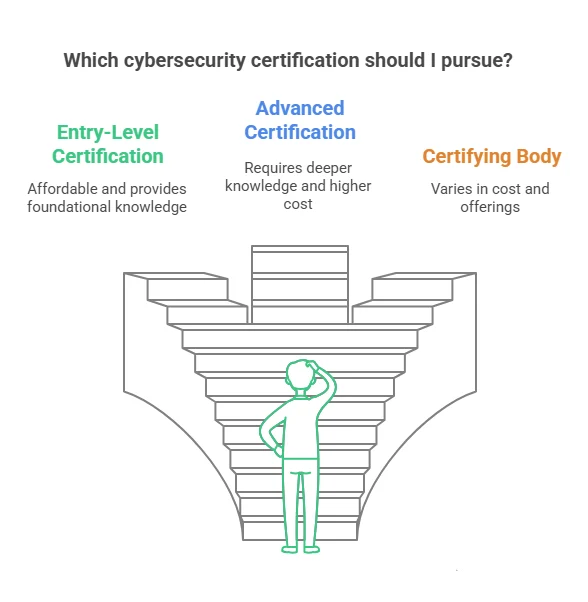
Average Cost of Popular Certifications
Cybersecurity certifications can range from a few hundred dollars to thousands. Below is a breakdown of some of the most popular certifications and their associated costs:
- CISSP (Certified Information Systems Security Professional):
- Price Range: $699 – $899
- The CISSP is one of the most recognized certifications in cybersecurity, offered by (ISC)². It is designed for professionals with extensive experience and expertise in information security. The certification exam cost itself is around $699, but additional costs for study materials and practice exams may bring the total closer to $1,000.
- CompTIA Security+:
- Price Range: $370
- Security+ is an entry-level certification ideal for those just starting out in cybersecurity. It focuses on foundational topics such as network security, compliance, and threats. The cost of the exam is about $370, making it an affordable option for beginners in the field.
- Certified Ethical Hacker (CEH):
- Price Range: $1,199
- Offered by EC-Council, the CEH certification is designed for professionals who want to specialize in ethical hacking and penetration testing. The certification exam costs around $1,199, and training courses can cost several thousand dollars depending on the provider.
- CISM (Certified Information Security Manager):
- Price Range: $760 – $1,070
- CISM, offered by ISACA, is a management-focused certification that is ideal for those looking to take on managerial roles in cybersecurity. The cost of the exam is approximately $760, but additional costs for training and study materials should be considered.
- CompTIA Cybersecurity Analyst (CySA+):
- Price Range: $370
- The CySA+ certification focuses on cybersecurity analysis and threat detection. It is also an entry-level certification with a similar price range to Security+, making it a great choice for individuals looking to specialize in cybersecurity operations.
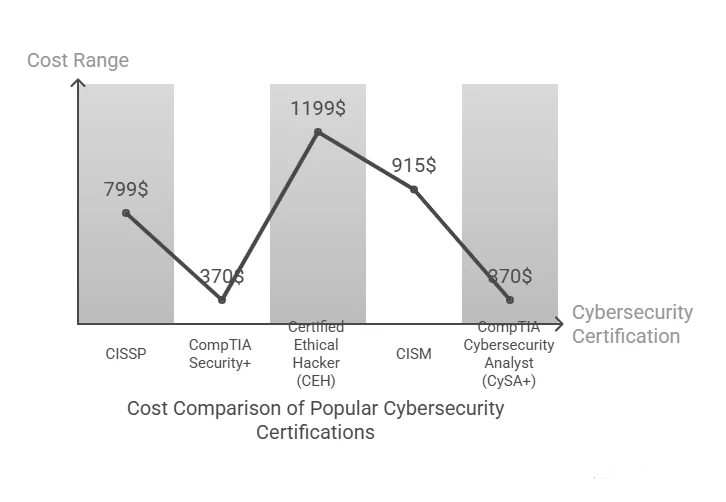
Additional Expenses
While the exam fees are the most obvious cost associated with cybersecurity certifications, there are additional expenses to consider when preparing for and maintaining certifications.
- Study Materials:
- Depending on the certification, study materials can range from books and online courses to boot camps and webinars. For instance, CISSP study guides can cost $50 to $300, while training courses for CompTIA Security+ may cost around $400 to $600.
- Online learning platforms like Udemy, LinkedIn Learning, and Pluralsight also offer affordable courses, but prices vary depending on the depth of the content and whether the courses offer certification preparation.
- Practice Exams:
- Practice exams are an essential part of the preparation process for many certifications. They provide insight into the types of questions to expect and help reinforce knowledge. The cost of practice exams can range from $50 to $200 or more, depending on the certification.
- Retake Fees:
- If an individual does not pass the certification exam on the first attempt, retake fees can add up. The cost of retaking an exam varies by certification, but it generally falls within the range of $100 to $400 per retake.
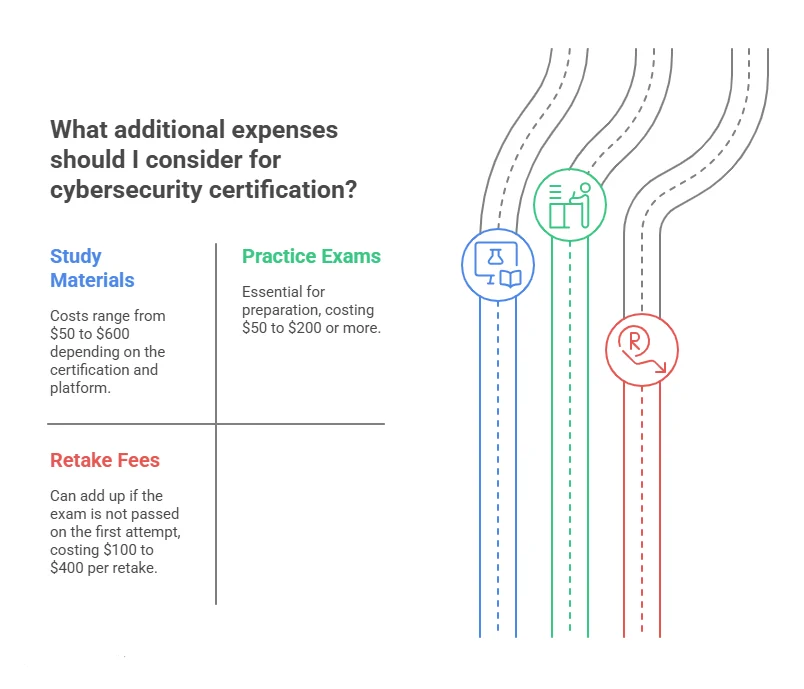
Financial Assistance or Discounts
Many certification bodies and organizations provide opportunities for financial assistance, discounts, or payment plans to ease the burden of certification costs. Here are some options to explore:
- Military and Veteran Discounts:
- Many certifying bodies, including CompTIA and EC-Council, offer discounts to veterans and active military personnel. These discounts can reduce the cost of the exam by 20% or more, making certifications more affordable for those who have served in the military.
- Scholarships and Financial Aid:
- Some organizations offer scholarships or financial aid for individuals pursuing cybersecurity certifications. Nonprofit organizations, community colleges, and training centers may provide financial assistance or discounted programs to those who meet specific criteria.
- Promotions and Bundled Packages:
- Certain certifying bodies or training providers may offer promotional discounts or bundled pricing for certification exams and associated study materials. These promotions can reduce the overall cost, making it easier to complete the certification process.
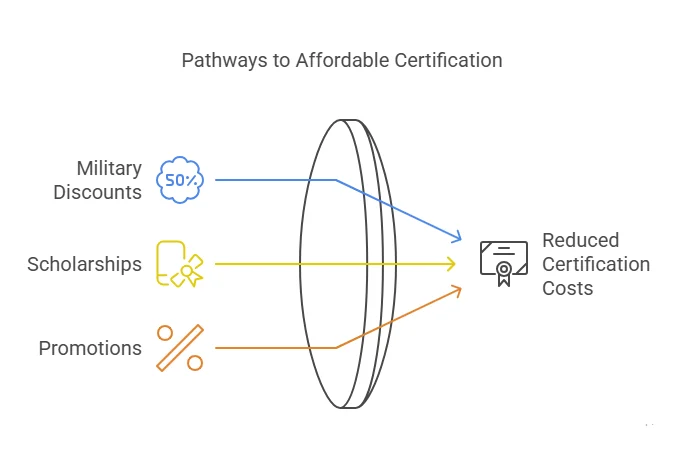
Employer Sponsorship
Many companies recognize the value of cybersecurity certifications and offer financial support to their employees to obtain them. Employer sponsorship programs can significantly reduce the out-of-pocket costs for employees seeking to advance their careers. Here’s how these programs work:
- Full or Partial Reimbursement:
- Some employers will cover the full cost of the certification exam, while others may offer partial reimbursement. This benefit is often available for employees who successfully pass the exam and continue working for the company for a set period afterward.
- Professional Development Budgets:
- Companies may allocate a portion of their annual budget specifically for professional development. Employees can use this budget to cover certification costs, including exams, study materials, and courses.
- Career Advancement:
- Employer sponsorship not only helps employees financially but also benefits the company by developing a more skilled workforce. Many employers view certifications as a way to promote their employees and fill critical cybersecurity roles within the organization.
Related Blog: Benefits of Cyber Security Certifications
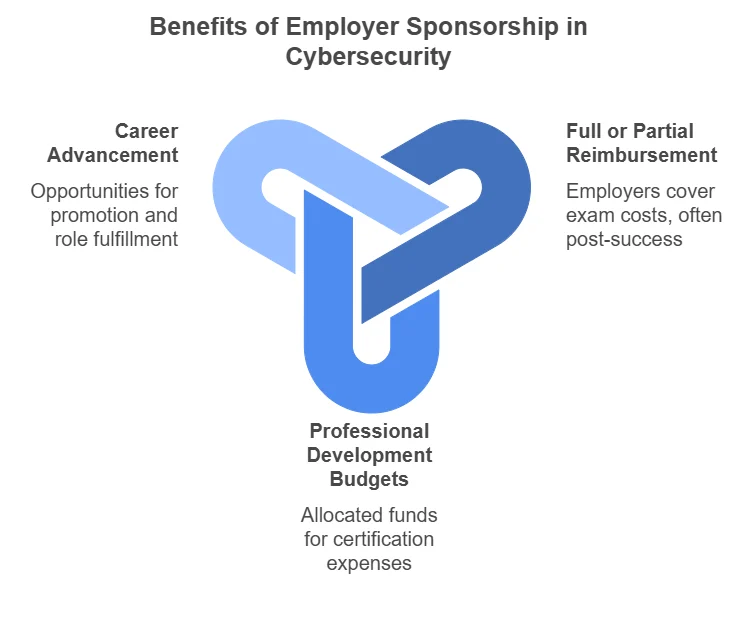
ROI of Cybersecurity Certifications
While the initial cost of obtaining a cybersecurity certification may seem high, the long-term benefits and potential return on investment (ROI) can make it a worthwhile endeavor.
- Salary Increases:
- Obtaining a certification can significantly increase an individual’s earning potential. According to industry surveys, certified cybersecurity professionals earn 20% to 30% more than their non-certified counterparts. For example, a CISSP-certified professional can earn upwards of $100,000 annually, compared to those with no certifications, who may earn around $70,000.
- Job Promotions:
- Certifications often open doors to higher-level positions and career advancement. With certifications like CISSP and CEH, individuals can qualify for managerial or leadership roles, such as security consultant, information security officer, or security architect.
- Job Security:
- In a field as critical as cybersecurity, certifications demonstrate expertise and commitment to the profession. This can increase job security, especially in a world where cyber threats are constantly evolving.
- Increased Marketability:
- Cybersecurity certifications enhance a professional’s resume and increase their marketability to potential employers. Certified individuals are more likely to stand out in a competitive job market and may have more job opportunities available to them.
Conclusion
In conclusion, the cost of cybersecurity certifications varies depending on several factors, including the level of certification, the certifying body, and the country in which the certification is offered. While the average cost of popular certifications like CISSP, CompTIA Security+, and CEH can be significant, there are also additional expenses for study materials, practice exams, and retakes to consider. Financial aid, discounts, and employer sponsorship programs can help offset these costs, making certifications more accessible.
The long-term benefits of obtaining cybersecurity certifications are substantial. With salary increases, job promotions, and enhanced job security, the return on investment (ROI) is clear. By investing in cybersecurity certifications, professionals not only improve their skill set but also increase their earning potential and career opportunities.
As a leader in cybersecurity certification and training, ACSMI offers comprehensive certification programs to help you achieve your career goals in the ever-growing cybersecurity field.
FAQs
What is the cost of the CISSP certification?
The CISSP certification typically costs between $699 and $899 for the exam, with additional costs for study materials and practice exams.
Are there discounts for veterans?
Yes, many certifying bodies, including CompTIA and EC-Council, offer discounts for military personnel and veterans.
What is the ROI of cybersecurity certifications?
The ROI of cybersecurity certifications includes salary increases, job promotions, and enhanced job security.
How much does CompTIA Security+ cost?
The CompTIA Security+ certification exam typically costs around $370.
Can my employer pay for my certification?
Many employers offer sponsorship programs, covering the full or partial cost of certifications for their employees.
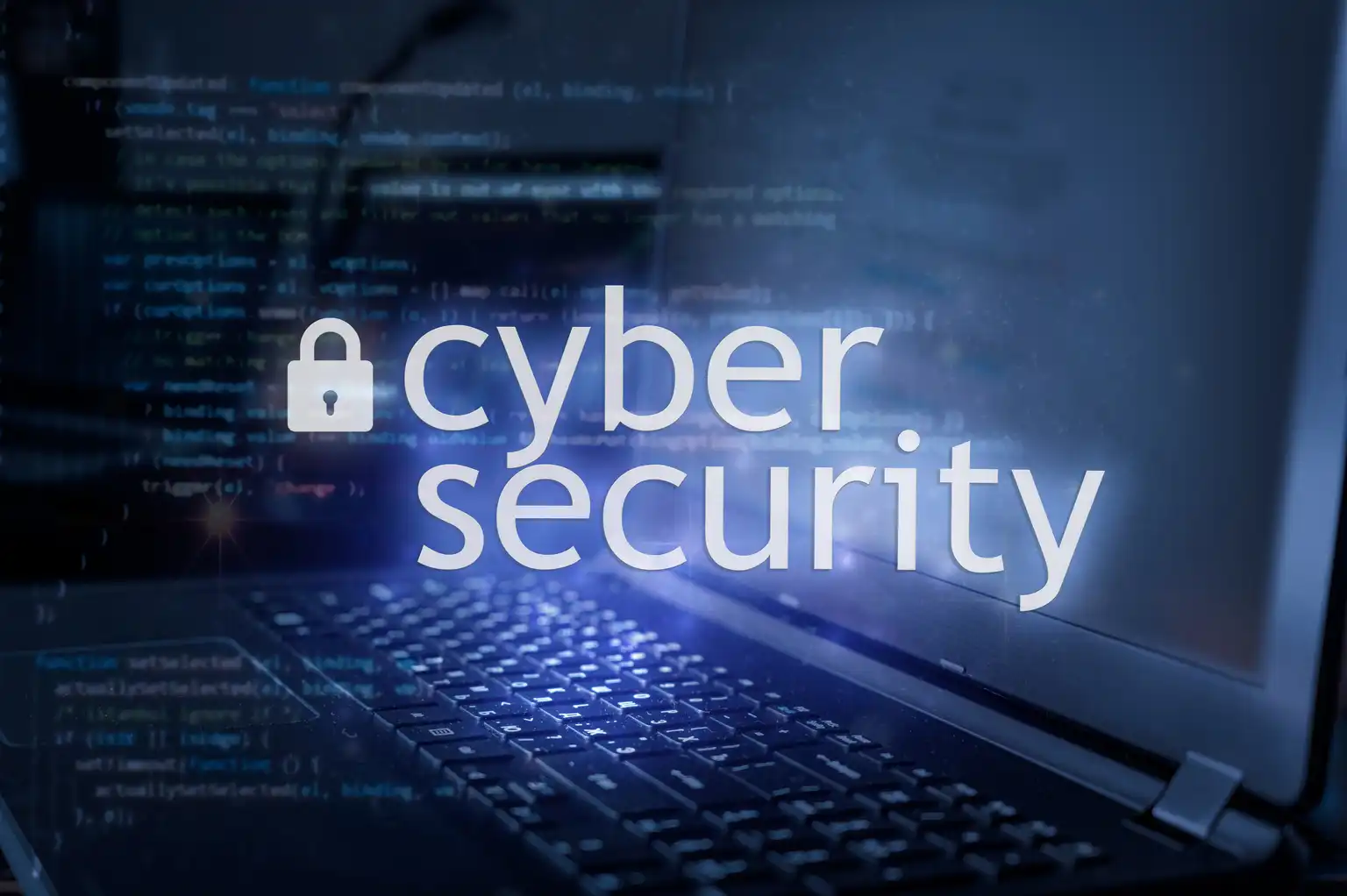
Leave a Reply